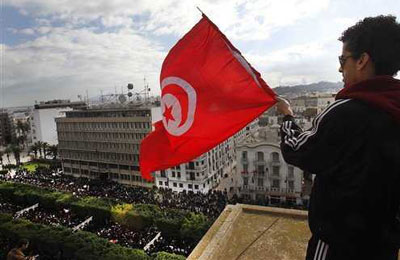
Tunisia needs $4.4bn in loans, aid next year
Tunis, November 18, 2012
Tunisia's government will need about 7 billion dinars ($4.4 billion) of loans and aid next year as it proceeds with a costly plan to compensate former political prisoners freed by the 2011 revolution, Finance Minister Slim Besbes said.
His comments, made in an interview at the Reuters Middle East Investment Summit, illustrated the financial pressures Tunisia faces as its post-revolution government, led by the moderate Islamist Ennahda movement, rebuilds the economy.
Industrial production and tourism earnings were hit hard by last year's political turmoil, driving the state budget deep into deficit.
At the same time, the government cannot ignore demands for support from the poor, thousands of former political prisoners and other groups that suffered under ousted president Zine al-Abidine Ben Ali.
"The government is also committed to restoring many of the former prisoners to work, and this will cost the state a lot of money," said Besbes, a former academic who previously served as deputy finance minister.
"The state will carry out its responsibility to provide immediate compensation to former prisoners who are in difficult situations because of their ideology," he added, without specifying the amount of aid required.
EXPENDITURE
Besbes' predecessor as finance minister, Hussein Dimassi, resigned in July, complaining about the cost of the compensation scheme and accusing the government of being more concerned about winning votes than about the health of public finances.
"The draft law for the compensation of beneficiaries of the general amnesty is the most serious of all; it was the straw that broke the camel's back," a statement from Dimassi's office read when he resigned.
"It will result in a very heavy expenditure for the state's budget, considering the high number of beneficiaries and the amount of the compensation."
Tunisian newspapers said the plan might cost as much as 750 million dinars.
In his interview with Reuters, however, Besbes said that next year's state budget could not escape pressures from the compensation programme, as well as projects to develop less affluent regions of the country and spending on social welfare for the poor.
As the birthplace of the Arab Spring upheaval - a Tunisian vegetable seller's suicide in December 2010 was the initial trigger for uprisings in the region - Tunisia is very sensitive to the need to cut unemployment and poverty, and that will require substantial spending, Besbes said.
"Our financial needs in the next year will be 7 billion dinars of loans and aid," he said. That figure compares with the 4.3 billion dinars that the government has said it plans to borrow in 2012.
To meet next year's needs, Besbes said that Tunisia was discussing with the World Bank a potential loan of $500 million, plus a $500 million loan from the African Development Bank.
In addition, the United States has pledged to guarantee a $500 million loan to Tunisia, the finance minister said.
At least four people were killed when hardline Islamist protestors stormed the U.S. embassy in Tunis in September over a film made in California that was deemed offensive to Islam. The incident raised fears of a decline in U.S. support for Tunisia, but Besbes said that the undertaking to guarantee the loan was made after the attack.
BOND ISSUE
Besbes also said that the Tunisian government would make its first issue of Islamic bonds next year, to help to finance infrastructure projects such as roads and hospitals. The sukuk issue will raise 1 billion dinars, he said.
Tunisia's new government is keen to develop Islamic finance, which was neglected for ideological reasons by Ben Ali's government. A Tunisian sukuk issue could potentially attract large amounts of Islamic funds from the wealthy Gulf.
Besbes did not give details on how Tunisia aims to meet the rest of next year's 7 billion dinar financing requirement. The International Monetary Fund said last week that it was willing to provide external financing to Tunisia, but Besbes did not mention this possibility.
The government will allocate 1.2 billion dinars next year to finance programmes aimed at creating more than 100,000 jobs, Besbes said. The unemployment rate has risen to an estimated 17 percent since the revolution.
At the same time, the government aims to limit the state budget deficit to 5.9 percent of gross domestic product next year and 2 percent by 2017, compared with an expected 6.6 percent this year, he said.
Another source of concern for economic policymakers is inflation, Besbes added. Inflation hit 5.7 percent in September, close to its highest level in more than a decade.
"It is important to reach an inflation rate not exceeding 4.5 percent in 2013," Besbes said, against 3.5 percent in 2011. - Reuters







